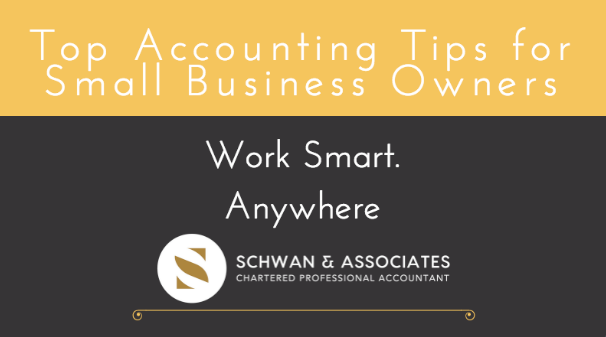Owning a small business means acting as the CFO of your company, in addition to all the other hats you wear in your business. Keep your financials under control with these small business accounting tips and tricks!
Tip 1: Review your financial reports regularly.
Don’t ignore the opportunity to visualize your financial standing. A proper accountant or accounting system should provide you with accurate, monthly financial reports such as:
-
- Income statement
- Balance sheet
- Gross margins by product
- Inventory listing
- Cash flow statements
- Budgets
- Financial statements by division or department
Stay up to date with your financials, and make sure your accountant keeps you in the loop on all your financial reports.
Tip 2: Hire an accountant before you start your business.
When you’re setting up a new business, there are several decisions to be made that require an accounting perspective. Types of decisions can include the type of business structure, choice of corporate year-end, share class structure for bonus and dividend purposes, and the physical workspace, equipment, and computer software required to perform the accounting functions of the business.
Starting a business is tough. Talk to an accountant before you start your business to avoid sticky situations in the future.
Tip 3: Keep a daily vehicle log of the kilometers driven for business use.
This log (which is often requested by Revenue Canada) provides the basis for a ratio of personal to business use that is applied when computing vehicle benefits/costs.
To learn how to easily track your kilometers without a paper logbook, see our blog: Which Vehicle Expenses Can I Claim on My Taxes?
Tip 4: Don’t delay in getting organized.
One of the best ways to get organized is to use the cloud for all your accounting needs! Access your information from anywhere, so you can stay fully up to date, and never miss adding something important. Get organized now and save yourself stress later!
Tip 5: Set aside money for taxes.
You know you’re going to have to pay taxes, and you know when you’ll have to pay them. So be prepared by systematically putting money aside for taxes throughout the year. Unpaid taxes can incur penalties and interest from the CRA, so make sure the money is there when you need it. When you put money aside each month, or each time a contract is paid, it won’t sting so much when they come due. Plus, you can avoid the CRA knocking on your door!
Tip 6: Watch your home claims.
“You may be able to claim a proportion of expenses like utilities, insurance, rent or property taxes, among others, if you run a business exclusively out of your home,” says Bruce Ball, a national tax partner with BDO Canada LLP in Toronto.
Make sure you understand which home expenses you are allowed to write off, and how much of each.
Tip 7: Don’t mix personal and business.
Whenever possible, separate your personal and business accounts – such as bank accounts or credit cards – for ease of administration and to take advantage of different rules. Your bookkeeping will be much smoother, and account reconciliations won’t be as time consuming.
Tip 8: Keep an eye on your invoices.
Before you start invoicing, make a plan for if clients are 30, 60, and 90 days late. Write your policies for late payments on your invoice. Remember, every late payment is an interest-free loan that hurts your cash flow.
Tip 9: Use the right software.
Business and bookkeeping tasks can be accomplished through a few taps on a smartphone or with automatic fetching. This is why small business accounting software has become an integral part of the small business owner’s toolbox. But each business is unique, and the best-rated app out there may not be the right one for you. Small business accounting software isn’t one size fits all.
Choose the software that will save your business time, effort, and many headaches in the future. Take your time deciding to make sure your software will integrate with existing processes and scale with your business. We’re familiar with all kinds of programs and apps, so feel free to reach out if you have questions about which could work best for you!
Tip 10: Go paperless.
You can use cloud-based software from any device with an internet connection. Online accounting means small business owners stay connected to their data and their accountants ALWAYS!
Go paperless! Working in the cloud will give you a better overview of your finances and improve collaboration with your team. Plus, you’ll have all your information on hand for decision-making.
Tip 11: Consider incorporation.
As a sole proprietorship or partnership, you declare all business-generated revenue through your personal tax return, at a taxable rate as high as 33% (Federal). As a Canadian-Controlled Private Corporation (CCPC), you pay 10% (federal) income tax on the first $500,000 of income. Incorporating comes with other benefits and stipulations, too; get in touch with us to discuss if incorporating is right for your business.
Tip 12: Don’t miss deadlines.
Owners of private incorporated businesses have six months after their corporate year-end to file their return. Despite this, any tax owing still has to be paid within 90 days. Consequently, business owners often get slapped with three months of costly interest on the amount owed when they wait the full six months to file.
The same thing occurs with non-incorporated businesses, such as self-employed entrepreneurs who report on a calendar year-end and file a personal return. Tax returns for the self-employed must be filed by June 15, but any tax owing must be paid by April 30. Meeting the April 30th deadline will prevent interest from accruing on the amount payable for those 46 days between the payment deadline and filing deadline.
Tip 13: Salaries or dividends.
Another key decision with tax implications for incorporated businesses is whether to pay salaries or dividends to yourself. This has to be thought through very carefully, as there are several advantages and disadvantages to each.
A dividend is not an expense to the corporation, so it obviously doesn’t qualify as a deduction for tax purposes. It is also taxed in the recipient’s hands at a much lower rate than a salary would be. However, the downside is it isn’t eligible for the Canada Pension Plan, nor is it counted as an eligible amount for registered retirement savings plan contributions (RRSPs). Up to 18% of the previous year’s earned income counts toward RRSP contributions. Salary counts as earned income; dividends do not. So, your decision depends on future savings opportunities versus short term tax benefits.
Tip 14: Make a budget.
Most of us hate to even hear the word budget, but it’s very necessary to separate the various types of expenditures you have on a monthly basis, and plan for how much you’re going to spend on each. Whether it’s money budgeted toward generating income, rent, marketing, or even your salary, it’s vitally important to know exactly where your revenue is being spent to manage it properly.
Tip 15: Bankruptcy should be your last resort.
If you are having financial difficulties, and are considering filing for bankruptcy, be sure to consider other options first. These include reworking your budget, consolidating loans, selling assets, or taking more formal actions such as a Division 1 Proposal. In a Division 1 Proposal, you can work with a trustee to pay your creditors a percentage of what you owe them over a period of time. If you’re struggling financially and don’t know what to do, reach out to us to see how we can help get you back on track without filing for bankruptcy.
Small tips and tricks like these can help you manage your cash flow and accounts. If you have questions about tax planning, bookkeeping processes, or any other accounting-related strategies, we’re always happy to help! Call us to get in touch, or send us a message, and we can point you in the right direction.










Nice and informative article. Thanks for sharing the accounting tips with us. Small tips and tricks like these can help us manage our cash flow and accounts. Learned a lot of things.
You’re welcome, I’m happy to help anyway possible.
I agree with all the things that you said in this article. I think that it is good to separate business and personal account. I think that it will be easier to do the accounting wihout having troubles in classifying which is which expenses is personal or business.
Yes, I totally agree with what you said. I think that hiring an accoutant will be a great help to business owners especially if they are not that good in accounting. Thanks for sharing this very interesting article.
This is some really good information about accounting tips. I read your content thoroughly and it is very helpful for me. Thank you so much for sharing.
You’re Welcome
but it’s very necessary to separate the various types of expenditures you have on a monthly basis, and plan for how much you’re going to spend on each. Whether it’s money budgeted toward generating income, rent, marketing, or even your salary, it’s vitally important to know exactly where your revenue is being spent to manage it properly.
Thanks